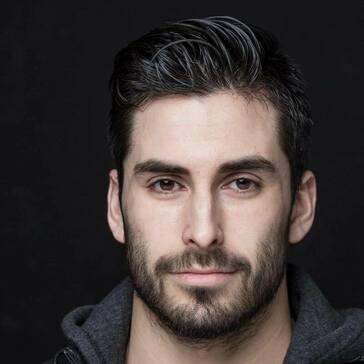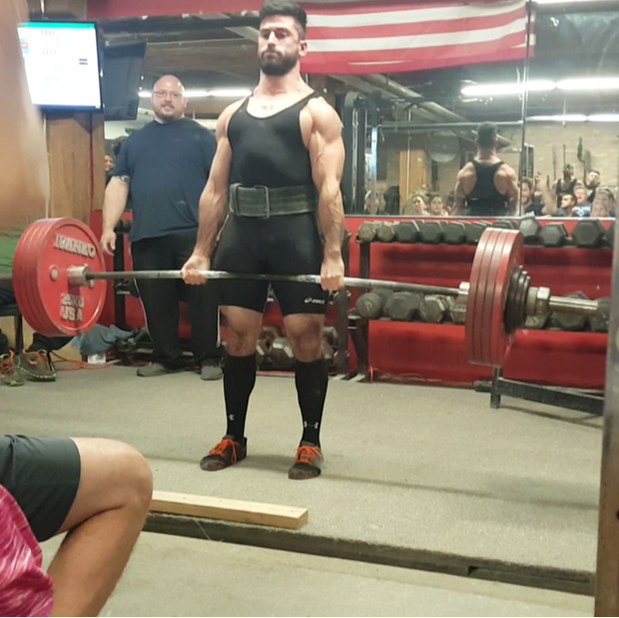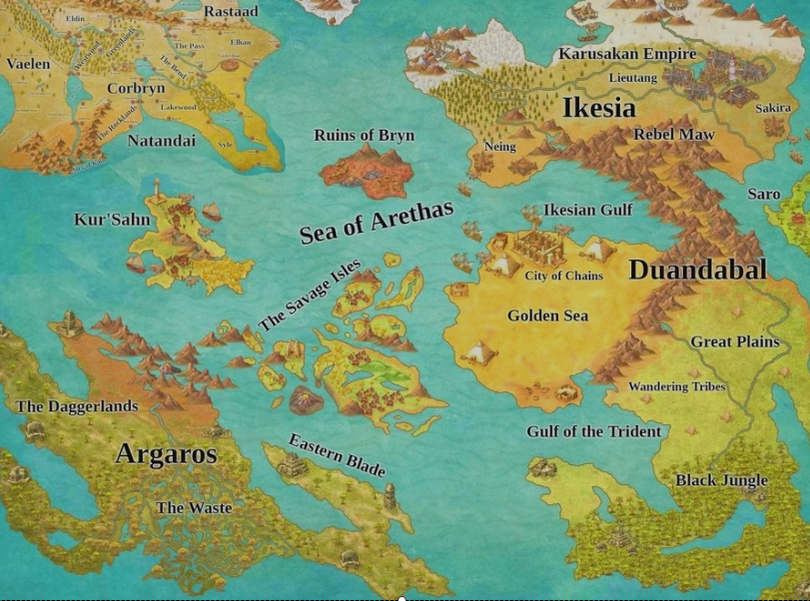"When I got a little older I discovered the Drizzt Do’Urden series (R.A. Salvatore) and was blown away. What year would I go back to for a single day? 2016. I don’t remember the exact day, but Chris Cornell (lead singer of Soundgarden and Audioslave), my favorite musician ever, performed a solo show near my apartment. I missed it because “I had work.” He died a year later, two days before I was going to see Soundgarden headline my favorite rock festival. My brother said the show I missed was the performance of a lifetime. I still haven’t gotten over it. You’re asking me a question about beer? Best interview ever. I have celiac disease, so I’m not supposed to drink most beer because the barley it’s brewed from contains gluten. I don’t get sick from beer (like I would with solid food), but it’s still not good for me. I drink gluten-free beer as much as I can, so Two Brothers Prairie Path is my default, but if I can find it, I’ll buy and hoard gallons of Omission IPA. It’s phenomenal. If I’m drinking outdoors, at a concert, etc, I’ll go with Miller Lite, because I have no self esteem. Whatever you do, though, stay away from Beer 30 Ice. Yes, that’s a real beer. It makes Hams and Natty Ice look like craft beer. That shit (can I curse?) is the devil. Unless you’re in college, in that case, it costs about $11 for a 30-rack, and it’ll leave you with some hilarious stories the morning after. Enjoy. What does a typical writing day look like for you? When and where do you do most of your writing? I’m a personal trainer, which means 12-13 hour days are the norm. I write a lot on my phone, whether it’s on the train, on my lunch break, etc. The 300-word sessions add up, and sometimes that’s all I can do for the day. Also, I find fewer grammatical errors when I write on my phone, and sometimes my prose is noticeably better. I think the slower pace helps me think, and because of the narrow screen view, I can zoom in on a single sentence and really dive into the mechanics of it. Try it, I swear I’m not crazy. On the weekends, I like to wake up around 8 or 9, crank up Spotify (rock, grunge, & metal), and pound out a good few hours. If I’ve got nothing planned, I’ll write and edit all day. My process is really chaotic and I’ve learned to accept that. Last month, I wrote for maybe 20 hours total. Last weekend, I wrote for over 20 hours.
"My training definitely serves as a compliment to the writing. I think there are many lessons from powerlifting that could benefit writers, or anyone, really. I could probably write a whole article about this concept alone, but I’ll keep it brief. Powerlifting is all about relentless improvement and absolute accountability. The human body doesn’t lie. You lift the weight or you don’t. There’s no subjectivity. No gray area. Success or failure. You’re the product of all your effort, nothing more, nothing less. It’s all discipline, humility, and mastery. I think anyone can benefit from applying those principles. As a fantasy writer myself, I know the genre often gets a bad rap in the writing world for not being ‘literary’ enough. What draws you to write fantasy and what is your response to that attitude? If generalizing an entire genre makes those people feel superior, good for them. I can find a bunch of “literary fiction” that’s nonsensical drivel, but that doesn’t make the whole genre worthless. I get it, there’s plenty of bad, shallow fantasy out there. Just like there’s bad, shallow sci-fi, mysteries, thrillers, romance, westerns, drama, suspense, horror, etc. But there’s also really great fantasy that explores complex themes like religion, politics, social status, race, friendship, love and relationships, death and the afterlife, the human condition, and much more. You just have to find it. And even if it’s “not literary,” who cares? Obviously, the fans don’t, and they’re the target audience, so they’re the ones who matter to the writer. There’s not some objective marker of merit, literary or otherwise. I love writing fantasy for three main reasons: 1. Sword fights. I’m not too proud to admit that I love the primal savagery of two people with conflicting goals settling their differences with steel in their hands. I wrestled, boxed, and trained in MMA for a while, and I enjoy exploring the motivations, applications, and consequences of physical violence. IN FICTION. Don’t fight people in real life, that’s just being a jerk. 2. Worldbuilding. I love the idea of designing a world from the ground up. Creating environments, geography, kingdoms, societies, customs, religions, rituals, and of course, the people who bring the world to life. With that, there’s plenty of potential to explore all those things that the literary snobs claim fantasy lacks. Oh, and did I mention MAGIC? Yeah, magic is great. I can’t wait to introduce it later in my series. 3. This is sort of a combination of the previous two, but when you can design any type of people/society/culture/kingdom you want, your potential for conflict is limitless. And because of the nature of medieval/fantasy worlds, often quite harsh and brutal, the way that conflict gets resolved is often very compelling. Today, if someone catches their friend stealing from them, it’ll result in a fight, or police involvement at worst. In a medieval world, the thief would be lucky to leave with their life, let alone their limbs intact. High stakes, I guess you could say. In my novel The Gatewatch the characters are inspired by the idealistic Viking ethos of boldness, cunning, and courage. In Sundering, the first book of your Shattered Fates Series, the main character Rylar is an unapologetic stoic. Was there a particular historical warrior code that helped to inspire this character? Rylar commands The Vanguard, which is a small but elite standing army. The Vanguard were aesthetically modeled off Spartan/hoplite warriors (heavily armored, spear, sword & shield, formation warfare). However, their functionality is based off modern special forces; their training is rigorous and brutal, they can function efficiently in small groups, and they have a strict hierarchy and can deploy extraordinarily quickly compared to other armies of that time period. Rylar, being their commander, is the epitome of what it means to be Vanguard. Unquestioning and uncompromising, he’s the consummate soldier, which ultimately proves an asset and a weakness. Having suffered much during his early life, and with only The Vanguard to cling to, he learned to bury everything so he could keep pushing forward. For him, to voice weaknesses, fears, and failings is to make them real. I think Rylar’s personal code evolved out of necessity rather than him consciously embracing any particular philosophy. "The Vanguard were aesthetically modeled off Spartan/hoplite warriors... their functionality is based off modern special forces; their training is rigorous and brutal, they can function efficiently in small groups, and they have a strict hierarchy and can deploy extraordinarily quickly compared to other armies of that time period." Dakstaan, one of the other characters in Sundering, speaks with a distinct dialect. How did you create the rules for his particular pattern of speech and do you have any advice for writers who want to use dialects? Dakstaan is from Rastaad, a northern country based on Scandinavia. There’s an archipelago called the Faroe Islands off the coast of Denmark where their dialect sounds Irish, despite being Scandinavian. Dakstaan’s accent is based off this, although not all people from his homeland speak as bizarrely as him. In addition to being foreign, he’s uneducated, and so his dialect is formed from both a heavy accent and the common speech of the peasants. He frequently leaves off the “g” on “ing” words, slurs words together (tell him = tell’im), and says “me” instead of “my” like the uneducated commoners. Other characters from the same country have their speech written normally, and it’s only mentioned in narration that they have an accent, which in their case, mirrors a Swedish or Norwegian accent (think Ragnar in Vikings). If you’re creating accents, establish the geography, general ideas of the language, and rules beforehand. For example, Dakstaan frequently uses Rastaadian sentence mechanics. Proper/common: I’ll see you later. Dakstaan: I’ll be seein’ ye. An anachronistic phrase, but you get the idea. He frequently puts things into present tense instead of a more digestible manner of speaking because that’s how his native tongue works, just like my mother (born in Colombia), says “control remote” instead of “remote control.” Once you have your general rules and ideas, create a directory of exact phrases and words and how you’ve written them, and use that as your reference point any time you write a scene with that character. Then double, triple, and quadruple check your dialogue with them. It’s so easy to forget the dialect and type a word correctly, and then miss it during editing because it’s invisible to us since the word is actually correct. Once you have your general rules and ideas, create a directory of exact phrases and words and how you’ve written them, and use that as your reference point any time you write a scene with that character.
You are currently in the throes of querying agents and publishers for your novel Sundering. Do you have any advice for writers who are in the midst of querying for their first novel? This is a tough one, because I haven’t gotten an agent yet, so I’m still in the midst of learning just like everyone else. Here’s a few basics, in no particular order. 1. For your pitch, cut to the core of your story. Character, desire, obstacle/conflict, stakes. Lay that out as cleanly as possible. 2. Do your research. Check the submission guidelines. Follow directions. We aren’t special. 3. Get someone to proofread your query. 4. Don’t take rejections personally. Writing is a business. Don’t publicly vent about your 58’th rejection on twitter. Agents are on twitter. Catch my drift? 5. Spend a lot of time on Queryshark. "Writing is a business. Don’t publicly vent about your 58’th rejection on twitter. Agents are on twitter. Catch my drift?" Find more short stories, book excerpts, blog posts, and book reviews at www.calplogan.com.
0 Comments
Leave a Reply. |
AuthorJoshua Gillingham is an author, editor, and game designer from Vancouver Island, Canada. Archives
April 2022
Categories
All
|




 RSS Feed
RSS Feed
